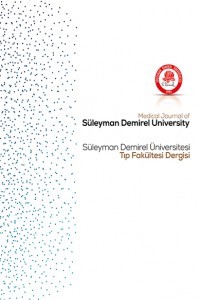SAĞLIK PROFESYONELLERİNİN SEPSİS HAKKINDAKİ BİLGİ VE ALGILARININ ARAŞTIRILMASI
Sağlık profesyonelleri, sepsis, bilgi, algı
INVESTIGATION OF KNOWLEDGE AND PERCEPTIONS OF HEALTH PROFESSIONALS ABOUT SEPSIS
Health professionals, sepsis, information, perception,
___
- 1- Shi M, Zhao C, Ge X, Yang H, Ge L, Zhu G, Xu W. Berberine Prevents Cognitive Disorders Induced by Sepsis by Regulating the Inflammatory Cytokines, Oxidative Stress and Neuronal Apoptosis in Rat Brain. Neuropsychiatry 2018; 8(1); 24–33.
- 2- Eitze S, Fleischmann-Struzek C, Betsch C, Reinhart K, the vaccination 60+ study group. Determinants of sepsis knowledge: a representative survey of the elderly population in Germany. Critical Care 2018;22:273.
- 3- Dugani S, Veillard J, Kissoon N. Reducing the global burden of sepsis. CMAJ 2017;189:E2–3.
- 4- Gül F, Arslantaş MK, Cinel İ, Kumar A. Changing Definitions of Sepsis. Turk J Anaesthesiol Reanim. 2017;45(3):129–138.
- 5- Poeze M, Ramsay G, Gerlach H, Rubulotta F, Levy M. An international sepsis survey: a study of doctors' knowledge and perception about sepsis. Critical Care 2004;8(6): R409-R413.
- 6- Fernando SM, Rochwerg B, Seely AJE. Clinical implications of the Third International Consensus Definitions for Sepsis and Septic Shock (Sepsis-3). CMAJ 2018;190 (36):E1058-E1059
- 7- Bone RC, Balk RA, Cerra F, Dellinger RP, Fein AM, Knaus W, Alan M, Fein MD, Ronald MH, Sibbald WJ. Definitions for sepsis and organ failure and guidelines for the use of innovative therapies in sepsis. Chest 1992;101(6):1644-1655
- 8- Singer M, Deutschman CS, Seymour CW, Shankar-Hari M, Annane D, Bauer, Bauer M, Bellomo R,Bernard GR, Chiche JD, Coopersmith CM, Hotchkiss RS, Levy MM, Marshall JC, Martin GS, Opal SM, Rubenfeld GD, Poll T, Vincent JL, Angus DC, MPH, Hotchkiss RS. The third international consensus definitions for sepsis and septic shock (Sepsis-3). Jama. 2016;315(8):801-810.
- 9- Vincent JL, Rello J, Marshall J, Silva E, Anzueto A, Martin CD, Moreno R, Lipman J, Gomersall C, Sakr Y, Reinhart K, for he EPIC II Group of Investigators. International study of the prevalence and outcomes of infection in intensive care units. JAMA 2009;302:2323–29
- 10- Dantes RB, Epstein L. Combatting Sepsis: A Public Health Perspective. Clinical Infectious Diseases 2018;67(8):1300-1302.
- 11- Cecconi M, Evans L, Levy M, Rhodes A. Sepsis and septic shock. Lancet 2018;392: 75–87
- 12- Dombrovskiy VY, Martin AA, Sunderram J, Paz HL. Facing the challenge: decreasing case fatality rates in severe sepsis despite increasing hospitalizations. Critical Care Medicine 2005;33(11):2555-2562.
- 13- Lagu T, Rothberg MB, Shieh MS, Pekow PS, Steingrub JS, Lindenauer PK Hospitalizations, costs, and outcomes of severe sepsis in the United States 2003 to 2007. Critical Care Medicine 2012; 40(3):754-761.
- 14- Fleischmann C, Thomas–Rueddel DO, Hartmann M, Hartog CS, Welte T, Heublein S, Hartog CS, Dennler U, Reinhart K. Hospital incidence and mortality rates of sepsis: an analysis of hospital episode (DRG) statistics in Germany from 2007 to 2013. Deutsches Ärzteblatt International. 2016; 113(10):159.
- 15- Torio CM, Moore BJ. Andrews RM. National inpatient hospital costs: the most expensive conditions by Payer, 2013. Statistical Brief # 204. Europe PMC 2016.
- 16- Lever A, Mackenzie I. Sepsis: definition, epidemiology, and diagnosis. BMJ 2007;335:879-883
- ISSN: 1300-7416
- Yayın Aralığı: Yılda 4 Sayı
- Başlangıç: 2015
- Yayıncı: Süleyman Demirel Üniversitesi
ÇİMENTOSUZ TOTAL KALÇA ARTROPLASTİSİ: KISA VE ORTA DÖNEM SONUÇLAR
Deniz İPEK, Fatih İbrahim PESİTLCİ, Yalim ATEŞ, Emrah KOVALAK
ASETABULUM KIRIKLARINDA ORTA DÖNEM KONSERVATİF VE CERRAHİ TEDAVİ SONUÇLARIMIZ
Recep DİNÇER, Tolga ATAY, Halil BURÇ, Yakup Barbaros BAYKAL, Vecihi KIRDEMİR
LAPAROSKOPİK KOLESİSTEKTOMİ SONRASI KOLEDOK TÜMÖRÜNÜ TAKLİT EDEN SİSTİK NÖROMA OLGUSU
Bilal TURAN, Nesime ERYILMAZ, İsa KARACA, İsmail ZİHNİ, İsa SÖZEN, Girayhan ÇELİK, Mehmet SABUNCUOGLU, Recep ÇETİN
SÜLEYMAN DEMİREL ÜNİVERSİTESİ TIP FAKÜLTESİ TIP TARİHİ GÖRSELLERİ
PLEVRAL HASTALIKLARIN TANISINDA VATS’IN ETKİNLİĞİ
Murat YILDIRIM, Ersin ÇELİK, Ahmet ÖCAL
Serdar KIRMIZI, Süleyman Emre AKIN
Nuri HAVAN, Mesut ÖZGÖKÇE, Sercan ÖZKAÇMAZ, Fatma DURMAZ, Hilmi DEMİRKIRAN, Mehmet Emin LAYIK, İlyas DÜNDAR
PULMONER HASTALIKLARDA TELEREHABİLİTASYON
ADOLESAN VARİKOSELEKTOMİ HASTALARININ DEĞERLENDİRİLMESİ
Yalcin KİZİLKAN, Samet ŞENEL, İbrahim AYKANAT, Melih BALCI, Cüneyt ÖZDEN, Altuğ TUNCEL
